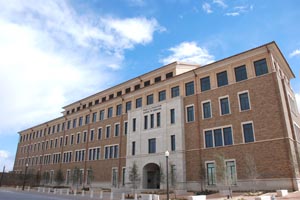Paul L. Foster School of Medicine Receives Accreditation

The school's inaugural class will graduate in May.
The Paul L. Foster School of Medicine has officially been approved for full accreditation from the Liaison Committee on Medical Education (LCME) for a period of eight years.
The LCME, sponsored by the Association of American Medical Colleges and the American Medical Association, is the nationally recognized accrediting authority for medical education programs leading to a medical degree in the United States and Canada.
“It has been an arduous task moving the accreditation process to a successful outcome, but well worth it. The rewards can be seen everywhere,” said Jose Manuel de la Rosa, M.D., Paul L. Foster School of Medicine founding dean and vice president for health affairs. “It is because of a team effort that our students, our city and the world now have the only fully accredited, four-year medical school on the U.S./Mexico border. We thank the El Paso community for helping make us what we are today a symbol of their hope and pride in our community.”
The accreditation approval process for the Paul L. Foster School of Medicine began in 2008 when the school received provisional accreditation that allowed it to begin recruiting students for its inaugural class of 40 students. That class, the Class of 2013, will graduate in May.
Students at the Paul L. Foster School of Medicine are educated using an innovative approach that includes a clinical presentation curriculum with early clinical experiences.
LCME reviewers gave the school six commendations for strengths in numerous areas including:
- The focused efforts and progress toward creating an increased educational and academic presence and improving the health of the border region
- Effective integration, relevancy and reception of year one and two curriculum, organized around and taught through clinical problems and diagnostic algorithms that anchor and relate basic science concepts with clinical skills and behavioral science
- An effort to integrate its mission into the curriculum through courses and experiences that immerse students in the culture and community of the Texas border region including a required medical Spanish course
- Taking steps to minimize the educational debt of medical students including maintaining low tuition rates and providing scholarship support
- The commitment and demonstrated effort of the faculty and administration in achieving excellence in medical education
- A robust faculty development process and mentoring system aimed at enhancing the skills of junior faculty
Related Stories
Celebrating Veterans: TTUHSC’s General Martin Clay’s Legacy of Service and Leadership
From his initial enlistment in the Army National Guard 36 years ago to his leadership in military and civilian health care management roles, Major General Martin Clay’s career has been shaped by adaptability, mission focus and service to others.
Texas Tech University Health Sciences Center School of Nursing Named Best Accelerated Bachelor of Science in Nursing Program in Texas
The TTUHSC School of Nursing Accelerated Bachelor of Science in Nursing (BSN) program has been ranked the No. 1 accelerated nursing program in Texas by RegisteredNursing.org.
TTUHSC Names New Regional Dean for the School of Nursing
Louise Rice, DNP, RN, has been named regional dean of the TTUHSC School of Nursing on the Amarillo campus.
Recent Stories
The John Wayne Cancer Foundation Surgical Oncology Fellowship Program at Texas Tech University Health Sciences Center Announced
TTUHSC is collaborating with the John Wayne Cancer Foundation and has established the Big Cure Endowment, which supports the university’s efforts to reduce cancer incidence and increase survivability of people in rural and underserved areas.
TTUHSC Receives $1 Million Gift from Amarillo National Bank to Expand and Enhance Pediatric Care in the Panhandle
TTUHSC School of Medicine leaders accepted a $1 million philanthropic gift from Amarillo National Bank on Tuesday (Feb. 10), marking a transformational investment in pediatric care for the Texas Panhandle.
Texas Tech University Health Sciences Center Permian Basin Announces Pediatric Residency Program Gift
TTUHSC Permian Basin, along with the Permian Strategic Partnership and the Scharbauer Foundation, Feb. 5 announced a gift that will fund a new pediatric residency.
